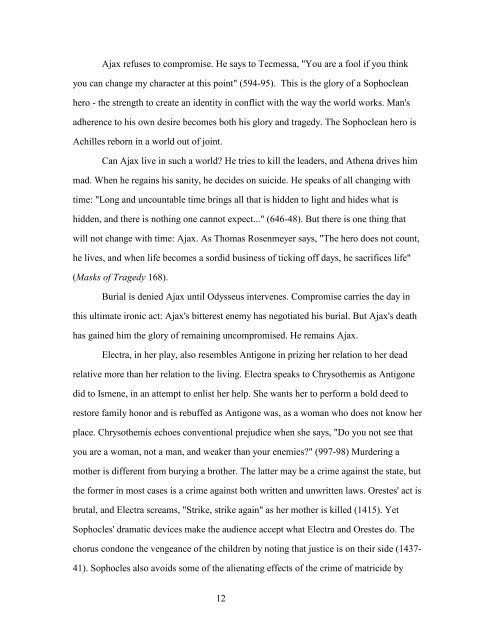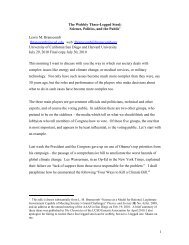1 Sophocles' Antigone Introduction, translation, and notes by ...
1 Sophocles' Antigone Introduction, translation, and notes by ...
1 Sophocles' Antigone Introduction, translation, and notes by ...
Create successful ePaper yourself
Turn your PDF publications into a flip-book with our unique Google optimized e-Paper software.
Ajax refuses to compromise. He says to Tecmessa, "You are a fool if you think<br />
you can change my character at this point" (594-95). This is the glory of a Sophoclean<br />
hero - the strength to create an identity in conflict with the way the world works. Man's<br />
adherence to his own desire becomes both his glory <strong>and</strong> tragedy. The Sophoclean hero is<br />
Achilles reborn in a world out of joint.<br />
Can Ajax live in such a world? He tries to kill the leaders, <strong>and</strong> Athena drives him<br />
mad. When he regains his sanity, he decides on suicide. He speaks of all changing with<br />
time: "Long <strong>and</strong> uncountable time brings all that is hidden to light <strong>and</strong> hides what is<br />
hidden, <strong>and</strong> there is nothing one cannot expect..." (646-48). But there is one thing that<br />
will not change with time: Ajax. As Thomas Rosenmeyer says, "The hero does not count,<br />
he lives, <strong>and</strong> when life becomes a sordid business of ticking off days, he sacrifices life"<br />
(Masks of Tragedy 168).<br />
Burial is denied Ajax until Odysseus intervenes. Compromise carries the day in<br />
this ultimate ironic act: Ajax's bitterest enemy has negotiated his burial. But Ajax's death<br />
has gained him the glory of remaining uncompromised. He remains Ajax.<br />
Electra, in her play, also resembles <strong>Antigone</strong> in prizing her relation to her dead<br />
relative more than her relation to the living. Electra speaks to Chrysothemis as <strong>Antigone</strong><br />
did to Ismene, in an attempt to enlist her help. She wants her to perform a bold deed to<br />
restore family honor <strong>and</strong> is rebuffed as <strong>Antigone</strong> was, as a woman who does not know her<br />
place. Chrysothemis echoes conventional prejudice when she says, "Do you not see that<br />
you are a woman, not a man, <strong>and</strong> weaker than your enemies?" (997-98) Murdering a<br />
mother is different from burying a brother. The latter may be a crime against the state, but<br />
the former in most cases is a crime against both written <strong>and</strong> unwritten laws. Orestes' act is<br />
brutal, <strong>and</strong> Electra screams, "Strike, strike again" as her mother is killed (1415). Yet<br />
<strong>Sophocles'</strong> dramatic devices make the audience accept what Electra <strong>and</strong> Orestes do. The<br />
chorus condone the vengeance of the children <strong>by</strong> noting that justice is on their side (1437-<br />
41). Sophocles also avoids some of the alienating effects of the crime of matricide <strong>by</strong><br />
12









